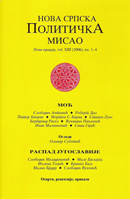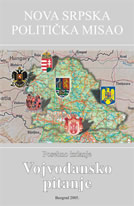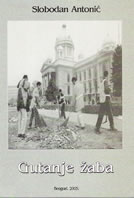|
 Serbia's parliamentary election results have not only caught analysts, researchers and bookies by surprise but also the political players themselves. Where will Serbia actually go following May 11, they ask? Not one of the major monitors and researchers predicted a win by the “For a European Serbia” coalition was even possible. Still less did they imagine that the coalition gathered around the Democratic Party would have an advantage of almost 10 per cent - 38.85 to 29.22 - over the Serbian Radical Party, which all surveys had favored. Serbia's parliamentary election results have not only caught analysts, researchers and bookies by surprise but also the political players themselves. Where will Serbia actually go following May 11, they ask? Not one of the major monitors and researchers predicted a win by the “For a European Serbia” coalition was even possible. Still less did they imagine that the coalition gathered around the Democratic Party would have an advantage of almost 10 per cent - 38.85 to 29.22 - over the Serbian Radical Party, which all surveys had favored.
As for the rest of contestants, their results more or less kept to the range of predictions, though both the Democratic Party of Serbia/New Serbia coalition and the Liberal Democratic Party won fewer votes than expected. With only 11.34 per cent of ballots, the populist bloc of Prime Minister Vojislav Kostunica is probably the biggest single loser. Kostunica's party was the only one to register a visible drop when compared to the previous parliamentary elections, but in spite of that, they still have a chance to have a decisive role in Serbian politics. In relative terms, we can say that the Liberal Party can be counted among losers with only 5.3 per cent of the ballots, thus barely crossing the threshold into parliament. In a way it can also be said for the Radicals, despite their winning half per cent and 25,000 more votes than they did in the last election. After all, the expectations of the Radicals, as well as all the predictions, promised them a lot more. But this time the traditional discipline of the Radical voters failed to translate into the expected results and it seems at least 200,000 or even 250,000 of their supporters stayed at home. The reasons for the relative stagnation in the Serbian Radical Party are partly to be found in its directionless, unmotivated campaign, in comparison to aggressive coalition around the Democratic Party. Another factor was the sense of fatigue in the Radical electorate, worn out by numerous “moral” victories in previous elections that have not brought them closer to power. The pro-European coalition ran the best and most energetic campaign by far, complete with negative campaigning against their rivals, media spinning and manipulation. Especially in the second half and finish of the campaign, they managed to overcome their principal handicaps – primarily the heterogeneous make-up of the coalition, including partnerships with such problematic figures as Vuk Draskovic, or Nenad Canak and managed to switch the campaign's focus from Kosovo to the European-reformist issue. Their greatest assets were the last-minute signing of Stability Agreement with the EU, a contract with the Italian car manufacturer Fiat and the vigorous media performance of their leader, Boris Tadic. But despite their excellent result, the Democratic Party and its allies could still be left empty-handed if they do not manage to gather enough votes to win a majority in the 250-seat parliament. The most natural coalition alliance, yoking the Democratic Party and the Liberal Democratic Party, has a total of only 115 seats in the new parliament, and even when seven deputies from ethnic minorities are factored in, they will still be short of the minimum majority of 126 MPs. On the other hand, there is the already announced coalition between Kostunica's Democratic Party of Serbia and the Radical Party, which musters a total of 108 MPs, who are also aiming to form a government. Therefore, despite the Democrat's better than expected result, it is groundless to say that the “pro-European” forces have actually won the elections. Furthermore, one could assume that Boris Tadic's coalition is close to finding itself in the same position as the Radicals after the previous two elections – to being the most numerous group in the parliament but without coming to power. Which is how we come to the second, and possibly the only real winner of these elections, the Socialist Party of Serbia-Association of Serbian Pensioners-United Serbia coalition. This won more than 300,000, or 7.57 per cent. The result itself is not that impressive, although the Socialists took about 80,000 more votes than they did last time. What is more important is the fact that the Socialist leader, Ivica Dacic, has taken over the kingmaker's role in politics from Vojislav Kostunica. This is because it is up to the Socialist Party now to decide who will form the next government. The 20 seats of Dacic's coalition will effectively decide the winner of these elections, which is a position that the Socialists will know well how to capitalize from in every sense. However, it should also be noted that the position the Socialist Party now finds itself in is not so comfortable and harmless. After all, a glance at the steady slide in support for Kostunica's Democratic Party of Serbia shows that there is danger in holding role of “tipping the scales”. A large political and media battle is now being fought around Dacic and the Socialists, including big players and even bigger stakes, with offers coming from all sides, as well as threaite the fact that the majority of the public until recently treated it as an anomaly and as a political relapse the Milosevic era. It is hard to say who cares more about the Socialists: the Democrats, whose top officials once urged the authorities to ban it, or the Radicals, who until yesterday accused them of collaboration with the Democratic Party and were constantly poaching thets and “friendly warnings”. All of a sudden everyone is worried about the fate, future and prospect of the Socialist Party, despg” the party, and in that sense, the Democratic Party might superficially appear a more suitable partner. On the other hand, their voters – on all the main issues, from the EU, to NATO, Russia, Kosovo and the Hague Tribunal – are infinitely closer to the Radical's supporters. Therefore, the dilemma the Socialists face is partly real, and partly manufactured by political and media lobbies concerned. It is a fact that their leaders have recently made steps towards “opening up”, “modernizing” and even “Europeanizinadicals and Kostunica's party. Indeed, when it comes to the majority of these issues, the stance of most Socialist voters is even more radical than the stance of the average voter for the Democratic Party of Serbia or the Radical Party. In that sense, a coalition with the Democrats would not only be going against the will of their voters, but would probably ensure the political demise of both Dacic and his party. Theoretically, it might be possible for the Socialists to regenerate their party and acquire new and different voters in a new government with the Democrats, but it is still not a very likely scenario, since being in power in a transition country can hardly be a steppingstone for a better rating and gaining new voters. That is why, in the end, it is more likely that the Socialist Party will try to form a coalition with Kostunica and the Radicals, even though there is then the question of whether the Democratic Party and Tadic would accept such an outcome, or whether they would try to prevent it by all means, which would push Serbia into a political crisis and trigger clashes. Although I don't believe that scenario will ha appen, one must bear in mind that such a denouement remains entirely possible. Djordje Vukadinovic is a political analyst and editor of Belgrade based magazine New Serbian Political Thought (Nova srpska politicka misao). |




.jpg)








 Serbia's parliamentary election results have not only caught analysts, researchers and bookies by surprise but also the political players themselves. Where will Serbia actually go following May 11, they ask? Not one of the major monitors and researchers predicted a win by the “For a European Serbia” coalition was even possible. Still less did they imagine that the coalition gathered around the Democratic Party would have an advantage of almost 10 per cent - 38.85 to 29.22 - over the Serbian Radical Party, which all surveys had favored.
Serbia's parliamentary election results have not only caught analysts, researchers and bookies by surprise but also the political players themselves. Where will Serbia actually go following May 11, they ask? Not one of the major monitors and researchers predicted a win by the “For a European Serbia” coalition was even possible. Still less did they imagine that the coalition gathered around the Democratic Party would have an advantage of almost 10 per cent - 38.85 to 29.22 - over the Serbian Radical Party, which all surveys had favored. 











